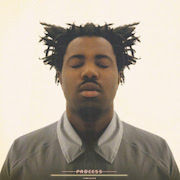You’d be forgiven for thinking Sampha Sisay was the new saviour of contemporary soul and R&B. Such has been the level of praise heaped upon his long-awaited debut album Process that before even listening to it, the idea it could be anything less than perfect now seems impossible: it’s difficult to wade out from the noise and not just agree that the emperor’s new clothes sure are beautiful.
And how could they not be? This is the golden boy who has lent his sweet vocals to all number of impressive artists: Solange, SBTRKT, Kanye. He has demonstrated time and time again a delicate and sensitive artistry.
The truth then, is disappointing – not because this album is terrible, but because it’s underwhelming. This is not to say it doesn’t have beautiful moments, it is not to detract from Sisay’s exquisite voice; but overall this feels like one in a long line of emotive “indietronica” records that slots into one of those “chill and alt R&B” Spotify playlists. It’s fine, but it’s kind of forgettable.
Process deals with Sisay’s grief at the recent loss of his mother, the struggles of his anxiety and a break-up – it’s an album wrought with mournful, candid poetry (“Dreaming, surely you will find me by the shore”, he says on ‘Timmy’s Prayer’). And yet, overall, there’s something about it that doesn’t quite sit right, and makes it too easy to disengage from the powerful, universal things he’s trying to say.
The production throughout is shiny and polished – of note is ‘Reverse Faults’, with its kaleidoscopic, mechanical hip hop-style sound. But overall the record’s finish is too glossy: at times it feels almost sterile. Sisay’s gorgeous voice is so controlled that – though rich and warm – it can seem devoid of the troubled emotions he’s singing about. Where he has delivered an expressive, doleful sound to other artists, he doesn’t yet seem able to consistently match that resonance when on his own terms.
In a recent interview with the Guardian, Sisay spoke of how he worried about feeling nothing with the release of his debut: “It’s that thing of not being able to embody something as much as I thought I would when reality comes.” And that’s not a bad way of describing what’s amiss here: for all he experiments with swirling electronic sounds and loops, for all he confronts his demons, there is overall a lack of conviction in the record.
‘Kora Sings’ starts off with ghostly vocals and dissonant, almost medieval twinkles of the kora, before whirring off into a strange dreamscape that sees Sisay wandering the desert and confronting the news of his mother’s cancer: “A pillow on your face soaking up those tears, who’s anyone to say you should have no fear?” Both the kora and the glitchy rhythms seem a nod to his Sierra Leonean heritage, but what should be a really emotionally resonant track doesn’t quite pack a punch. The lyrics here are tremendous, and it’s sonically sublime, but both the production and his delivery miss the mark in not embodying the sweet fragility of his words: the whole thing is so polished he could be singing about anything and you wouldn’t necessarily notice.
The standout comes in ‘(No One Knows Me) Like The Piano’ – with just his voice and that instrument, Sisay weaves the powerful tale of the piano he first learnt on, in his mother’s home and – while a little schmaltzy – it is quite beautiful. Without the intrusive glimmers of electronica, this track gains a real sense of warmth and intimacy that feels lacking elsewhere. When he says “You would show me I had something some people call a soul”, he blurs the line between talking about the instrument and talking about his mother, and it’s a touching conceit.
And it’s moments like that which highlight how much of the rest of the record blurs together – not unpleasantly, but mostly unmemorably.
With lustrous production and a harrowing emotional background, it’s a shame how easily this can be filed away under “middle of the road” – a record that doesn’t bring something particularly new to the table. For his remarkable voice, Sampha’s debut album shows him far less at ease with his own story than with that of others.


